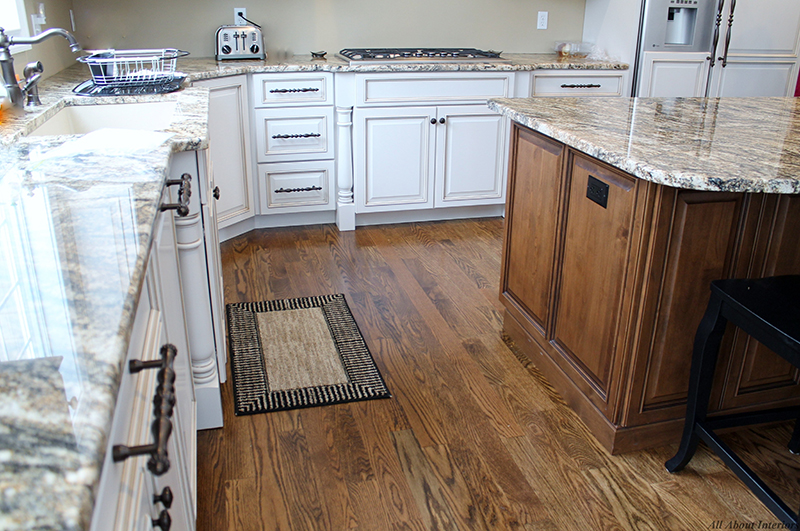A kitchen is a high-traffic room that needs a floor that’s able to withstand ordinary wear. For many years, most homeowners thought that in the kitchen, hardwood flooring wasn’t the right material. With the availability of many choices of finishes and wood types, today, hardwood floors have really changed. We chose to ask the expert, Jessica. Jessica Kane is a knowledgeable writer for GoHardwood, a great source for discount hardwood flooring.
Hardwood floors can now serve for years as long as you’re willing to stick to a maintenance routine and wipe up spills. When selecting a wood floor, you’ll want to first know the pros and cons of each hardwood floor in order to make the right kitchen hardwood flooring choice:
All About Interiors
Solid Hardwood Floors
Solid hardwood is produced using a single piece of wood. You can choose solid hardwood flooring that is prefinished or an unfinished. Factory finished hardwood comes with already applied stains and coatings, ready for installation. Unfinished hardwood allows you to choose the stain color that suits your needs.
Just like other floors, solid hardwood flooring has some advantages as well as disadvantages.
Some of the pros:
They are easy to clean and maintain
Long shelf life
Hardwood floors are safe and healthy to humans and pets. They do not promote the buildup of mold, allergens, and bacteria in your home.
Eco-friendly
Solid hardwood is available in different species, designs, styles, and colors, giving you a wide variety of options to choose from. So you can choose what match your existing kitchen as well as personal preferences.
And the cons:
In high traffic areas like kitchen, solid hardwood floors require regular polishing to maintain its finish
Costly compared to other types of floor
Solid hard floor finish is susceptible to scratching from heavy traffic, pet nails, and high heeled foot wearers
Engineered Wood Floors
Engineered wood flooring is made of wood plies fused together with heat and pressure in a cross-grain configuration. If you want an engineered floor for your kitchen, you’ll want to choose unfinished instead of prefinished.
A kitchen needs constant cleaning and maintenance, and with beveled edges of prefinished hardwood floors that are difficult to clean, your cook room can get really messy.
The pros of engineered hardwood:
They are easy to install and maintain.
No finishing touches are required.
They are healthy to house dwellers.
They’re eco-friendly, meaning they are taken from the sustainable forests.
They offer elegance and sophistication. In case of humidity fluctuations, engineered floors don’t cup or gap, making them more stable than other types of floor.
They can last for decade
As for the cons, pretty much just one:
Can be very expensive
This is especially true if you choose to buy the interlocking system. You don’t do refinishing constantly as doing so can damage the manufacturers’ finishing touches.
Bamboo Hardwood Floors
Even though bamboo flooring is produced from a type of grass, most of its properties are similar to that of hardwood floors. This kind of floor has gotten a lot of attention since it was introduced in the market about two decades ago.
Bamboo flooring is engineered; grass strands are sliced and shredded, glue is added, and then the mixture is pressed back together with heat to form the flooring boards.
The pros of bamboo:
Bamboo flooring is relatively easy to maintain; you only need to sweep, vacuum or damp mop it regularly.
Bamboo floors are eco-friendly. The plant can grow to maturity in a little period as three to five years. Also, bamboo plants are more renewable than hardwood trees which can take over 20 years to reach maturity.
In addition, the bamboo material is more resistant to water damage, warping, and stains than the hardwood material.
Some types of bamboo are strong, hard, and durable.
Refinishing Bamboo floors can be easy, and reapplying finish coats give it a fresh look.
The elegance of a room is elevated almost instantly with Bamboo flooring.
Fiscally speaking, Bamboo floors are not costly to buy; they go for as much as hard floors
The cons of bamboo:
They are susceptible to scratches and dings.
They are prone to the damage from water and excessive humidity.
Bamboo has a temporary look that doesn’t with all décor
If you’re looking for a traditional way of flooring your kitchen, you’ll probably choose solid hardwood flooring. However, making your own choice all by yourself, based on the tips given above, is the best thing you can do to yourself. Unlike in the past few years when engineered flooring was a new thing in the design industry, today, almost everyone out there has already heard or used it.
So use practical considerations to choose the type of floor you want. If you still can’t make a sound decision regarding what you want for your kitchen flooring, a professional can help. Seek their advice today.
This post is a collaborative effort and may contain relative and relatable affiliate links. All opinions are our own and for informational purposes.


